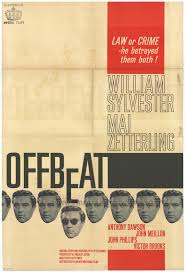Offbeat (film)
| Offbeat | |
|---|---|
 | |
| Directed by | Cliff Owen |
| Written by | Peter Barnes |
| Produced by | E.M. Smedley-Aston |
| Starring | William Sylvester Mai Zetterling John Meillon Anthony Dawson |
| Cinematography | Geoffrey Faithfull |
| Edited by | Antony Gibbs |
| Music by | Ken Jones |
Production company | Northiam Productions |
| Distributed by | British Lion Film Corporation (UK) |
Release date | 1961 |
Running time | 71 mins |
| Language | English |
Offbeat (AKA The Devil Inside in the U.S.) is a 1961 black-and-white British crime film directed by Cliff Owen and starring William Sylvester, Mai Zetterling, John Meillon and Anthony Dawson.[1] In the film, an MI5 officer goes undercover to catch a criminal gang.
Plot[]
After a police sergeant investigating a crime gang is murdered, Scotland Yard are frustrated in tracking down the outfit responsible for large scale bank and jewellery robberies. They bring in Layton, a loner from MI5, to infiltrate the gang.
Layton poses as Steve Ross, a criminal who, unknown to the gang, has died and gone missing at sea. He finds the gang is organised like a business, with salaries, pensions, and a camaraderie he has not known before. He also becomes romantically involved with a gang member, Ruth Lombard. As the plot progresses, she starts to become suspicious of his identity but has feelings for him and doesn’t voice her suspicions.
In a lengthy caper section, the gang drill and tunnel their way into an underground vault filled with jewels. They make their getaway and meet with the potential buyer of the jewels, who strikes a hard bargain. The buyer, who had known the real Steve Ross, spots that Layton is different man. Layton admits his impersonation. Scotland Yard arrive and arrest the whole gang. Layton feels he has betrayed his new friends, with whom he had found comradeship and love but who now reject him.
Cast[]
- William Sylvester - Layton / Steve Ross
- Mai Zetterling - Ruth Lombard
- John Meillon - Johnny Hemick
- Anthony Dawson - James Dawson
- Neil McCarthy - Leo Farrell
- Harry Baird - Gill Hall
- John Phillips - Supt. Gault
- Victor Brooks - Inspector Adams
- Diana King - Maggie Dawson
- Gerard Heinz - Jake
- Ronald Adam - J. B. Wykenham
- Neil Wilson - Pat Ryan
- Joseph Furst - Paul Varna
- Nan Munro - Sarah Bennett
- Anthony Baird - Constable
Critical reception[]
TV Guide gave the film 2.5 out of four stars, calling it a "good programmer" ;[2] and Mystery File wrote, "after a slow beginning, I’d have to say that halfway into the film if not earlier, I was hooked to the screen, waiting for the answer. A minor film, to be sure, but recommended, definitely so."[3] The film historians Steve Chibnall and Brian McFarlane describe it as "a work of genuine ideological dissonance which questioned the conventional wisdom about crime and punishment", and they note that Kinematograph Weekly said at the time that Offbeat "carries a kick of one twice its size".[4]
References[]
- ^ "BFI Database entry". BFI. Archived from the original on 14 January 2009.
- ^ "Offbeat". TV Guide.
- ^ "» Movie Review: OFFBEAT (1963)".
- ^ Steve Chibnall & Brian McFarlane, The British 'B' Film, Palgrave Macmillan, London, 2009, p. 59.
External links[]
- English-language films
- 1961 films
- British films
- 1961 crime films
- Films directed by Cliff Owen
- British crime films
- 1960s British film stubs
- 1960s crime film stubs